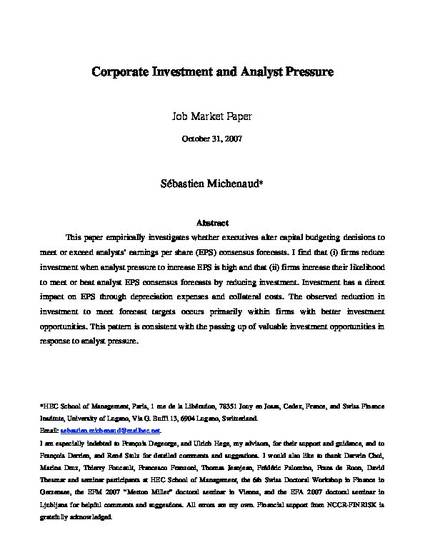
Presentation
Corporate Investment and Analyst Pressure
Finance International Meeting, AFFI-EUROFIDAI
(2007)
Abstract
This paper empirically investigates whether executives alter capital budgeting decisions to meet or beat analysts' earnings per share (EPS) consensus forecasts. I find that (i) firms reduce investment when analyst pressure to increase EPS is high and that (ii) firms increase their likelihood of meeting or beating annual or quarterly analysts' EPS consensus forecasts by reducing investment. Investment has a direct impact on EPS through depreciation expenses and collateral costs. The observed reduction in investment to meet forecast targets occurs primarily within firms with better investment opportunities, better governance, high CEO compensation, and high levels of opacity. This pattern is consistent with information asymmetries driving the passing up of valuable investment opportunities in order to create positive earnings surprises and short-term focus. This practice was widespread between 1981 and 2007, but exhibited a dramatic surge after the passage of the Sarbanes-Oxley Act on July 30, 2002.
Keywords
- Capital Budgeting,
- Analyst Coverage,
- Earnings Surprises,
- Sarbanes-Oxley
Disciplines
- Finance,
- Accounting and
- Business
Publication Date
October 31, 2007
Location
Paris, France
DOI
10.2139/ssrn.1071706
Citation Information
Sébastien Michenaud. "Corporate Investment and Analyst Pressure" Finance International Meeting, AFFI-EUROFIDAI (2007) Available at: http://works.bepress.com/sbastien-michenaud/7/
